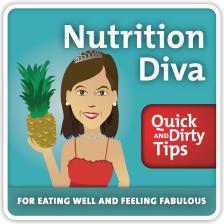Nutrition Tips for Headache Prevention
Can certain foods trigger headaches? Can nutritional supplements offer drug-free relief? Read on for Nutrition Diva’s tips for preventing headaches with diet and lifestyle changes.

In the first of this two-part series, I shared some tips for getting rid of a headache without resorting to drugs. Today, I have some tips that may be even more useful for those who suffer from frequent headaches: How to prevent those headaches before they start.
Do Certain Foods Trigger Headaches?
If you have a lot of headaches, I bet you’ve come across lists of foods that are said to trigger headaches: caffeine, alcohol, chocolate, cheese, and artificial sweeteners are among the most common ones. Sure enough, patients report that avoiding these foods seems to reduce the frequency of their headaches.
Yet when researchers have attempted to confirm this, they usually fail to find strong evidence that these foods are actually linked to headaches in any statistically measurable way. It could be that foods are a factor for some but not all migraine sufferers.
As I talked about in a recent show, a small number of people seem to be sensitive to histamines, a naturally occurring compound found in certain foods. For these folks, eating foods that are high in histamines can cause a number of symptoms, including headaches. Others appear to have similar sensitivities to the amino acid tyramine or to nitrites in foods.
Perhaps not coincidentally, most of the commonly cited headache-triggering foods are high in histamines, tyramine, nitrites—or all three! If you were to follow a low histamine diet, such as the one I described in episode #295, you would effectively reduce your intake of all three of these suspected compounds. And, not surprisingly, this approach has been helpful for some (but not all) chronic headache sufferers.
If eliminating common trigger foods (or following a low histamine diet) reduces your headaches, I’d call that a win. But if changing your diet doesn’t seem to make a difference, I think you can go back to enjoying these foods in moderation.
See also: What Does “Moderation” Mean, Exactly?
Can an Anti-inflammatory Diet Reduce Headaches?
A low histamine diet is not the only dietary approach for headaches. Because overproduction of inflammatory compounds in the body can play a role in chronic pain, some experts recommend an anti-inflammatory diet for headache relief. This approach is supported by research, which has found that increasing your intake of anti-inflammatory nutrients like monounsaturated fats and omega-3s, and reducing your intake of omega-6 fats, which are thought to be pro-inflammatory, can reduce the frequency and/or severity of headaches.
See also: Does the Ratio of Omega-6 Fats Really Matter?
Translated into food choices, this would mean eating more avocados, nuts, olive oil, fish, flax, and hemp and reducing your intake of corn, soy, and vegetable oils, and processed foods made with them.
As I talked about in episode #41 (“Foods that Fight Inflammation”), an anti-inflammatory diet has many other benefits as well. Whether or not you suffer from frequent headaches, I suggest listening to that episode for more tips on how to beat chronic inflammation with diet.
Avoid Skipping Meals
Low blood sugar and dehydration can both bring on headaches so those who are susceptible to headaches are well advised to drink lots of fluids and avoid skipping meals. That doesn’t mean you need to eat constantly—people who are overweight are more likely to suffer from chronic headaches! But try to avoid going more than 4-5 hours between meals, except of course when you are sleeping.
Supplements for Headache Prevention
You’ll find plenty of advice on the Internet about supplements that are supposed to help with chronic headaches—things like feverfew or high dose B vitamins. The only nutritional supplement that has solid good scientific support for reducing headaches is magnesium. Specially, taking 400 mg per day of a magnesium oxide supplement has been found to be effective in preventing headaches. But don’t overdo it. In larger amounts, magnesium oxide has a strong laxative effect.
More Drug-Free Ways to Prevent Headaches
Finally, behavioral techniques such as biofeedback, relaxation techniques and stress reduction have been shown to be just as effective as drug therapy for migraines and other chronic headaches (as well as cheaper) but they tend to be underutilized. Below you’ll find links to resources that can help you locate a practitioner for one or more of these techniques in your area. Or, here’s something even easier: A regular yoga practice has also been found to reduce both the frequency and intensity of migraines.

Resources:
American Headache Society
Association for Applied Psychophysiology and Biofeedback
Association for Behavioral and Cognitive Therapies
References:
Harel Z, Gascon G, et al. Supplementation with omega-3 polyunsaturated fatty acids in the management of recurrent migraines in adolescents. J Adolesc Health. 2002 Aug;31(2):154-61.
Hoffmann J, Recober A. Migraine and triggers: post hoc ergo propter hoc? Curr Pain Headache Rep. 2013 Oct;17(10):370. doi: 10.1007/s11916-013-0370-7.
John PJ, Sharma N, et al. Effectiveness of yoga therapy in the treatment of migraine without aura: a randomized controlled trial. Headache. 2007 May;47(5):654-61.
Linde K, Allais G, et al. Acupuncture for tension-type headache. Cochrane Database of Systematic Reviews 2009, Issue 1. Art. No.: CD007587.
Penzien DB, Irby MB, et al. Well-Established and Empirically Supported Behavioral Treatments for Migraine. Curr Pain Headache Rep. 2015 Jul;19(7):500.
Ramsden CE, Faurot KR, Zamora D, et al. Targeted alteration of dietary n-3 and n-6 fatty acids for the treatment of chronic headaches: A randomized trial.Pain. 2013;154(11):10.1016/j.pain.2013.07.028. doi:10.1016/j.pain.2013.07.028.
Schafer AM, Rains JC, et al. Direct costs of preventive headache treatments: comparison of behavioral and pharmacologic approaches. Headache. 2011 Jun;51(6):985-91.
Verrotti A, Di Fonzo A, et al. Obesity and headache/migraine: the importance of weight reduction through lifestyle modifications. Biomed Res Int. 2014;2014:420858.
Headache image courtesy of Shutterstock.
You May Also Like…






